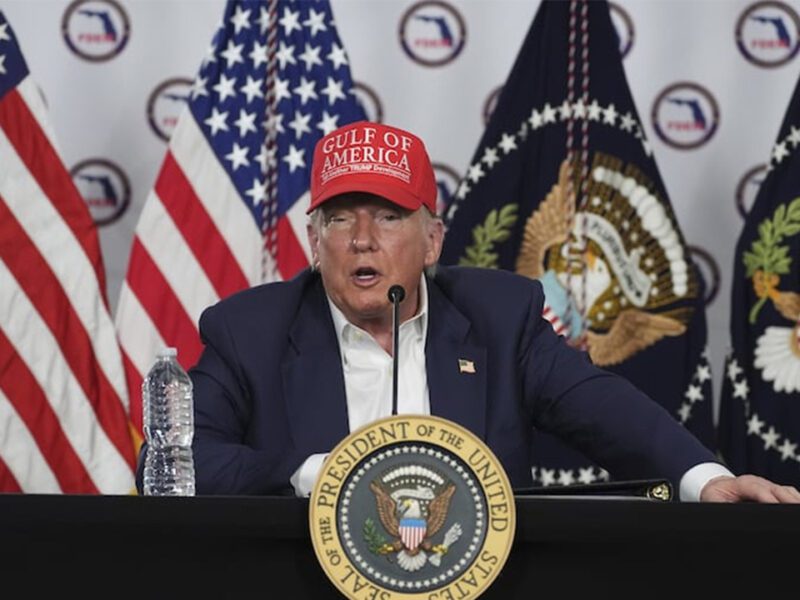DeSantis unveils $99.7 billion plan with gas tax holiday, more cash for schools, law officers
Orlando Sentinel | By Gray Rohrer | December 9, 2021
TALLAHASSEE — Flush with federal stimulus cash and a robust economic recovery from the COVID-19 pandemic, Gov. Ron DeSantis unveiled his budget recommendations Thursday, a $99.7 billion plan that includes salary hikes for teachers and law enforcement, and more money for K-12 schools, environmental projects and cancer research.
DeSantis said his policies of reopening more quickly from pandemic-related shutdowns provided the spark that helped the state’s economy rebound.
“As a result of our commitment to freedom, Florida’s economy continues to thrive and Floridians are better able to provide for their families,” DeSantis said at a news conference in the Capitol.
The spending plan is a suggestion to lawmakers, who will draft the budget during the 60-day legislative session that begins Jan. 11.
DeSantis’ budget would be a $1.8 billion decrease from the current year budget, which was boosted by federal stimulus funds to help states cope with the economic fallout of the pandemic.
There’s $3.5 billion in leftover federal stimulus funds in the recommendations, which would help pay for bonuses and salary increases to law enforcement officials, and a five-month moratorium on the 25-cent-a-gallon state gas tax, starting July 1.
DeSantis has criticized lax federal spending in the past but has resisted calls from U.S. Sen. Rick Scott to return the funds, saying they would be sent out to other states.
Democrats slammed DeSantis for relying on American Rescue and Recovery Act funds passed by a Democratic Congress while criticizing federal spending.
“As the governor continuously attacks President Biden, attacks the federal government and the administration, the reality is that we could not balance this budget or even give out tax breaks if it wasn’t for President Joe Biden,” said state Rep. Anna Eskamani, D-Orlando.
Much of those federal funds will be used to pay for DeSantis’ gas tax cut. About $1.2 billion will supplement the state’s transportation work program, which the gas tax helps to pay for.
When DeSantis released his gas tax cut plan last month, he said it could save the average two-car household up to $200 because retailers would pass on the savings to consumers. But based on the 25 cents a gallon DeSantis said will be saved on the tax, a family would need to fill up a 12-gallon tank 67 times in 20 weeks to achieve those savings.
Federal funds would also be used to pay for $453.1 million in pay hikes for state workers, with much of it targeted to law enforcement officials to stem chronic recruitment and retention problems.
And it will help pad state reserves to more than $15 billion.
About $75.4 million would increase the salaries of 4,500 state police, so new hires would receive a 20% increase in base pay and existing workers would get a 25% boost in pay. The plan includes $124.2 million to increase the pay of prison guards to $20 per hour, and $1.4 million to give 580 state firefighters a salary increase.
Another $225 million would go to non-law enforcement state employees, with raises dependent on the pay structure of individual agencies, but averaging about 4% for rank and file workers and dwindling to 1% or less for senior management.
Teachers will be in line for salary increases again, as DeSantis included $600 million for them, a $50 million increase over the current year. His goal is to raise the minimum starting salary for teachers to $47,500, which not all school districts have reached. On top of the raises, there would be a $1,000 bonus for teachers and principals, about $238 million.
The total K-12 schools budget would be $23.9 billion, or about $8,000 per student, an increase of $189 over the current year.
Universities’ budgets, however, would see a $44.8 million cut, to $5.3 billion, and DeSantis pledged to keep tuition rates frozen next year.
“We will not be doing tuition increases for Florida’s colleges and universities,” DeSantis said. “These colleges and universities throughout the country are way too expensive.”
The plan includes $660 million for Everglades restoration and $195 million in water quality improvement projects and calls for $100 million for cancer research.





